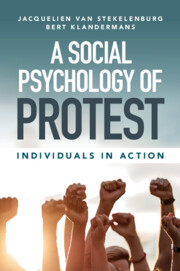Book contents
- A Social Psychology of Protest
- A Social Psychology of Protest
- Copyright page
- Contents
- Figures
- Tables
- Acknowledgments
- Chapter 1 Introduction
- Chapter 2 The Legacy of the Past
- Chapter 3 What Is Contextualized Contestation?
- Chapter 4 Dynamics of Demand
- Chapter 5 Dynamics of Supply
- Chapter 6 Dynamics of Mobilization
- Chapter 7 Context Matters, But How?
- Chapter 8 Should I Stay or Should I Go?
- Chapter 9 Politicization, Polarization, and Radicalization
- Chapter 10 Conclusion
- References
- Index
Chapter 9 - Politicization, Polarization, and Radicalization
Published online by Cambridge University Press: 23 November 2023
- A Social Psychology of Protest
- A Social Psychology of Protest
- Copyright page
- Contents
- Figures
- Tables
- Acknowledgments
- Chapter 1 Introduction
- Chapter 2 The Legacy of the Past
- Chapter 3 What Is Contextualized Contestation?
- Chapter 4 Dynamics of Demand
- Chapter 5 Dynamics of Supply
- Chapter 6 Dynamics of Mobilization
- Chapter 7 Context Matters, But How?
- Chapter 8 Should I Stay or Should I Go?
- Chapter 9 Politicization, Polarization, and Radicalization
- Chapter 10 Conclusion
- References
- Index
Summary
Chapter 9 is dedicated to three processes steering the cyclicity of protest, namely politicization, polarization, and radicalization. Simon and Klandermans elaborated on the dynamics of politicization of collective identity. A process of politicization implies support of third parties is sought and the environment becomes divided into allies and opponents. Polarization concerns distancing of the opposing camps. The more polarized the relationship becomes, the less deviation from the group’s opinions and actions is accepted and the more opposing opinions and acts are rejected. Eventually, this may result in radicalization. Also, in declining movements with many “exiters,” sustained participation can indicate radicalization. Take the violent Black Panthers, which played a short but important part in the civil rights movement, believing that Martin Luther King’s non-violent campaign had failed and any promised changes to their lifestyle via the “traditional” civil rights movement would take too long or simply would not be introduced at all. Hence, in light of the declining civil right movement, both disengagement and radical sustained participation were observed. To understand the social psychological correlates of the volatility of protest, politicization, polarization, and radicalization warrants elaborate investigation.
Keywords
- Type
- Chapter
- Information
- A Social Psychology of ProtestIndividuals in Action, pp. 198 - 223Publisher: Cambridge University PressPrint publication year: 2023



